When selling your products online, choosing the best ecommerce platform is important. The top ecommerce platforms can help you achieve your goals, from simple store management to secure payment processing.
Running an ecommerce business is thrilling. You get to choose your business name, design a logo, and develop a website to showcase your items to the world.
But, while it’s easy to get caught up in your to-do list, it’s equally critical to consider where your company is headed. What tools will you need in the future?
In this comprehensive guide, I ranked and reviewed the 13+ best ecommerce platforms, as well as my top picks, so you can choose the best one for you.
Ecommerce platforms are now thriving as vibrant online business hubs, expertly blending AI marketing tools, recruiting tools, and website builders. This collaboration creates engaging experiences that foster growth for both buyers and sellers, going beyond transactions to provide a journey.
But how do you choose the best ecommerce platform for your business? There are so many options available, each with its own features, benefits, and drawbacks. How do you compare them and find the one that suits your needs and budget?
Ecommerce is slowly but steadily taking over our lives. Amazon has over 100 million Amazon Prime members, according to Jeff Bezos.
Shipping is usually free. Two-day shipping is being replaced by one-day or two-hour shipping.
There are numerous ecommerce platforms to choose from. Almost 94% of all internet users have made an online purchase.
I’d like to make this decision easier for you by highlighting the best ecommerce software, so you can find the best solution for your online store.
What are Ecommerce Platforms?

Ecommerce platforms are software applications that allow you to build, manage, and operate an online store. They give you all of the tools and features you need to sell your products or services online, such as:
- Website builder that lets you design and customize your online store
- Shopping cart that allows your customers to add items to their orders and checkout securely
- Payment gateway that processes online transactions and accepts various payment methods
- Inventory management system that tracks your stock levels and updates them automatically
- Marketing Tool that helps you promote your store and attract more customers
- An analytics dashboard that gives you insights into your store’s performance and customer behavior
- A customer service module that enables you to communicate with your customers and handle their queries and complaints
Ecommerce platforms can be either hosted or self-hosted. Hosted ecommerce platforms are cloud-based solutions that take care of all the technical aspects of running an online store, such as web hosting services, security, updates, and maintenance. You simply pay a monthly fee and access your store through a web browser. Some examples of hosted ecommerce platforms are Shopify, BigCommerce, Wix, and Squarespace.
Open-source software applications that you download and install on your own server are self-hosted ecommerce platforms. You have more control and flexibility over the functionality and appearance of your store, but you must also handle technical issues yourself or hire a developer. WooCommerce, Magento, PrestaShop, and OpenCart are examples of self-hosted ecommerce platforms.
How to Choose the Best Ecommerce Platform for Your Business

Choosing the best ecommerce platform for your company can be a difficult task because there are numerous factors to consider and options to consider.
Here are some key features to look for when comparing different ecommerce platforms to help you make an informed decision:
User-Friendliness
Because it affects both you and your customers, user-friendliness is an essential component of any ecommerce platform. You want an easy-to-use and navigate platform so that you can easily set up and manage your store. You also want a platform that gives your customers a smooth and intuitive user experience, allowing them to easily browse, shop, and checkout.
Some indicators of user-friendliness are:
- Drag-and-drop website builder that lets you create and edit your store’s design without coding
- Responsive design that adapts to different devices and screen sizes
- Clear and simple dashboard that shows you all the essential information and settings
- Comprehensive help center and support team that can assist you with any issues or questions
- A fast and reliable loading speed that ensures your store runs smoothly
Scalability
Another important feature of any ecommerce platform is scalability, which defines how well your store can handle growth and change. You require a platform that can grow and evolve with your company while not sacrificing performance or functionality.
Some indicators of scalability are:
- A flexible pricing plan that allows you to upgrade or downgrade as needed
- A robust hosting infrastructure that can handle high traffic volumes and spikes
- Wide range of integrations and extensions that let you add new features and functionalities to your store
- A multichannel selling capability that enables you to sell on different platforms and marketplaces
- A global reach that allows you to target different regions and languages
Customizability
Customizability is another important feature of any ecommerce platform because it influences how well your store can be distinguished from competitors. You want a platform that lets you customize every aspect of your store’s appearance and functionality in order to create a distinct and memorable brand identity.
Some indicators of customizability are:
- A large selection of themes and templates that suit different niches and styles
- Powerful editor that lets you modify every element of your store’s design
- A code access option that lets you tweak the HTML, CSS, or JavaScript of your store
- Flexible API that lets you connect with third-party services and tools
- A developer community that offers support and resources for custom development
Security
Another important feature of any ecommerce platform is security, which affects how well you can protect your store and customers from cyberattacks and fraud. You require a platform with a high level of security and dependability in order to provide a secure and reliable shopping environment.
Some indicators of security are:
- An SSL certificate that encrypts the data exchanged between your store and your customers
- A PCI compliance certification that ensures your store meets the industry standards for payment processing
- Fraud prevention system that detects and prevents fraudulent transactions
- Backup and recovery system that saves and restores your store’s data in case of emergencies
- 24/7 monitoring service that alerts you of any issues or threats
SEO-Friendliness
Another important feature of any ecommerce platform is SEO friendliness, which affects how well your store ranks on search engines like Google or Bing. You want a platform that includes SEO features and best practices so you can optimize your store for increased organic visibility and traffic.
Some indicators of SEO-friendliness are:
- A clean and semantic code structure that makes it easy for search engines to crawl and index your store
- A mobile-responsive design that ensures your store performs well on mobile devices
- URL structure that is descriptive and keyword-rich
- A meta tag editor that lets you add titles, descriptions, keywords, etc. to each page of your store
- An XML sitemap generator that creates a map of all the pages on your store
- A robots.txt file editor that lets you control which pages are accessible or not by search engines
What Are the Best Ecommerce Platforms?

Here are my top picks for the best ecommerce platforms to try this year:
- Nexcess – Best Overall
- Hostinger – Best for Beginners
- Shopify – Best for Dropshipping
- BigCommerce – Best for Large Businesses
- WooCommerce – Best Ecommerce Plugin for WordPress
- Open Cart – Best for International Selling
- Square Online – Best for Local Businesses
- Squarespace – Best Customized Themes & Templates
- Ecwid – Best for Existing Websites
- Shift4Shop – Feature Rich Ecommerce Platform
- Sellfy – Best for Selling Digital Goods
- Volusion – Best User-Friendly Ecommerce Platform
- Big Cartel – Best for Artists
1. Nexcess
Best Overall.
Nexcess is a hosting provider that offers managed ecommerce solutions for WordPress and WooCommerce, as well as an online store builder called Store Builder.
There are hosting options for WordPress, Magento, WooCommerce, and other platforms.
They also provide hosting for ecommerce platforms such as Drupal and BigCommerce.
You also get one-click auto-scaling to handle a sudden increase in traffic.
Not only do they provide hosting, but they also assist you in creating a storefront for your WooCommerce store using their Store Builder tool.
Simply answer a few pertinent questions, and the tool will create a one-of-a-kind storefront based on your responses.
They also do not cut corners when it comes to customer service.
You can expect expert support 24 hours a day, 7 days a week, as well as free white-glove site migrations.
If you choose fully managed Magento Hosting, you will be assisted by a Magento Master on staff.
Features:

- Fast and secure hosting: Nexcess provides optimized web hosting for ecommerce websites, with features such as automatic scaling, caching, backups, SSL certificates, CDN, etc.
- Premium plugins and themes: It includes a selection of premium plugins and themes for WordPress and WooCommerce, such as Astra Pro, Elementor Pro, Beaver Builder, Jetpack Pro, etc.
- Smart sales and performance tools: It offers tools that help improve the sales and performance of ecommerce websites, such as cart abandonment recovery, product reviews and ratings, performance monitoring and testing, etc.
- Easy-to-use design tools: Nexcess provides a simple and intuitive interface for building and managing ecommerce websites, with a drag-and-drop editor, a variety of templates and design features, a one-click installer, etc.
- 24/7 expert support: It also offers reliable and responsive support from ecommerce experts via phone, email, chat, ticket system, etc.
- A built-in CDN with 22 locations.
- Cloud accelerator to speed up load times.
- Customizable technology stack.
- Dev site staging to test updates.
Perhaps one of my favorite things about Nexcess is that each of its features are accessible with every plan, even the most basic.
The price varies according to factors such as storage and bandwidth.
Pros:
- Affordable pricing: Nexcess offers competitive pricing for its ecommerce solutions, starting from $5/month for StoreBuilder and $19/month for managed WordPress and WooCommerce hosting.
- Intuitive interface: Nexcess makes it easy to create and manage ecommerce websites without any coding or design skills required. Users can choose from a variety of templates and design features, or customize their own.
- Flexible and scalable: It allows users to scale their ecommerce websites according to their needs and preferences. Users can add more products, features, integrations, etc., without having to worry about the hosting infrastructure or performance.
- WordPress and WooCommerce compatible: It is compatible with WordPress and WooCommerce, which are the most popular and powerful platforms for ecommerce websites. Users can leverage the features and functionality of these platforms to create unique and successful online stores.
Cons:
- Limited customization options: Nexcess does not offer much customization options for its StoreBuilder solution. Users have to choose from the available templates and design features, or use the code editor to make changes.
- No native payment processor: It does not have its own payment processor for its ecommerce solutions. Users have to integrate with third-party payment gateways such as PayPal, Stripe, etc., which may charge additional fees or require extra steps.
- No free trial or plan: It does not offer a free trial or plan for its ecommerce solutions. Users have to pay for the first 3 months upfront to get started with Store Builder or managed WordPress and WooCommerce hosting. However, they do offer a 30-day money-back guarantee.
Pricing:

Nexcess offers a variety of plans based on the platform that your website is built on. These include:
- Fully Managed WordPress Hosting: $13.30/mo.
- Fully Managed WooCommerce Hosting: $13.30/mo.
- Fully Managed Magento Hosting: $34.30/mo.
🔥 Get Started with the Nexcess Web Hosting & get 30% OFF! 🔥
💡 Related guide: 13 Best AI Tools for Affiliate Marketing in 2024
2. Hostinger
Best Ecommerce Platform For Beginners.
Hostinger is a hosting provider that offers ecommerce solutions for WordPress and WooCommerce, as well as other platforms such as PrestaShop, Magento, OpenCart, etc.
- Hostinger is an ecommerce platform designed to help businesses expand their audience and boost sales.
- The platform offers easy setup and management of an online store, including features like product listings, secure payment processing, inventory management, and customer accounts.
- It provides a user-friendly experience for customers, ensuring a smooth purchasing process.
- The platform includes powerful analytics tools to track performance and identify trends, enabling businesses to make informed decisions.
- Hostinger web hosting services is one of the best hosting providers for beginners.
- Hostinger offers a range of sleek and modern templates to give your online store a professional look.
- The platform also provides advanced customization options to tailor the website to your specific brand and design preferences.
Features:

- Fast and reliable hosting: Hostinger provides optimized hosting for ecommerce websites, with features such as free SSL certificate, free domain name, unlimited bandwidth and email accounts, one-click installer, etc.
- Multiple platform support: Hostinger supports various ecommerce platforms, such as WordPress and WooCommerce, PrestaShop, Magento, OpenCart, etc., allowing users to choose the platform that suits their needs and preferences.
- Website builder: It offers a website builder that lets users create and manage ecommerce websites with a drag-and-drop editor, hundreds of templates and design features, mobile optimization, SEO tools, marketing and analytics tools, etc.
- Simple inventory management: It allows you to keep track of your inventory and ultimately benefit your customers.
- Multiple payment gateways: There are over twenty different payment methods available, including all major credit cards, debit cards, and popular payment methods.
Pros:
- Low-cost pricing: Hostinger offers competitive pricing for its ecommerce solutions, starting from $1.59/month for a single website and $3.99/month for unlimited websites.
- User-friendly interface: It makes it easy to create and manage ecommerce websites without any coding or design skills required. Users can choose from a variety of templates and design features, or customize their own.
- Multiple platform support: It allows users to choose from different ecommerce platforms, such as WordPress and WooCommerce, PrestaShop, Magento, OpenCart, etc., giving them more flexibility and options.
- Hostinger, as one of the most affordable web hosting providers, provides excellent features and a dependable platform for launching and managing your e-commerce store.
- The dashboard is simple to use and allows you to quickly set up, customize, and manage your online presence.
Cons:
- No free trial or plan: Hostinger does not offer a free trial or plan for its ecommerce solutions. Users have to pay for the hosting plan upfront to get started with their ecommerce website. However, they do offer a 30-day money-back guarantee.
- Limited storage space: It offers limited storage space for its ecommerce hosting plans, ranging from 10 GB to 100 GB. Users may need to upgrade their plan or purchase additional storage if they have a large or growing ecommerce website.
- No phone support: It does not offer phone support for its ecommerce solutions. Users can only contact the support team via email or chat.
Pricing:

- Ecommerce hosting plans start at $1.59/mo for a single website and $3.99/mo for unlimited websites.
- They have a single plan for $2.99/month, which is 75% OFF the regular price.
🔥 Get Hostinger Web Hosting Services, now 75% OFF + 3 months FREE ! 🔥
💡 Related guide: 27 Best & Highest-Paying AI Affiliate Programs in 2024
3. Shopify
Best Ecommerce Platform For Dropshipping.
Shopify is one of the most popular ecommerce platforms in the world, powering over 1.7 million online stores in 175 countries. It is a hosted solution, meaning it takes care of all the technical aspects of running an online store, such as hosting, security, updates, and maintenance. You simply pay a monthly fee and access your store through a web browser.
- Shopify is known for its ease of use, requiring no coding skills to create and manage a store.
- It offers a simple and intuitive interface for users.
- There are over 100+ themes to choose from for customization.
- Customization can be done easily with a drag-and-drop editor.
- Shopify’s app store provides over 6,000 apps to add new features to your store.
- It allows selling on multiple channels like Facebook, Instagram, Amazon, eBay, and more.
- Multichannel selling capability is a key feature of Shopify.
- Shopify provides various tools and services to support business growth.
- Shopify Payments, Shopify Marketing, Shopify Analytics, Shopify Experts, Shopify POS, and more are available.
- Support is available 24/7 from Shopify’s team via phone, email, or chat.
Features:
Shopify offers a comprehensive set of features that cover everything from product management, inventory control, order fulfillment, payment processing, marketing tools, analytics, and more.
You can also extend the functionality of Shopify with thousands of apps that integrate with various services and platforms, such as email marketing tools, ai marketing tools, ai business tools, social media platforms, loyalty programs, etc.
Some of the notable features of Shopify include:
- Product variations, options, collections, and tags
- Digital and physical products, subscriptions, gift cards, etc.
- Product reviews and ratings
- Cart recovery emails
- Built-in blogging platform
- SEO optimization
- Mobile-friendly design
- Multiple payment options
- Automatic tax calculations
- Multiple shipping options and rates
- Order management and tracking
- Customer accounts and profiles
- Inventory management
- Coupons and discounts
- Reports and analytics
- Shopify POS system
Pros:
- Customers can buy products directly from your website if your catalogue is easily integrated into Google Merchant Centre.
- You can find the perfect look for your website among 70+ professional themes.
- Edit HTML and CSS in the simplest way possible to completely customize your website.
- A comprehensive blogging platform allows you to share your article and interact with your customers.
- You don’t have to worry about calculating taxes for your products if you use automatic taxes.
- Fulfillment centers assist you in managing your inventory and quickly and easily fulfilling orders.
- Can tailor e-commerce web applications to your brand’s look and feel.
Cons:
- Transaction fees: Shopify charges a transaction fee ranging from 0.5% to 2% on every sale made through its platform unless you use Shopify Payments as your payment gateway. This can add up to a significant cost over time.
- Limited customization: Shopify does not allow much customization beyond its themes and apps. You cannot access or modify the core code of your store unless you upgrade to Shopify Plus, which is an enterprise-level plan starting at $2,000 per month.
- Basic SEO features: Shopify does not offer many built-in SEO features or best practices. For example, it does not generate XML sitemaps automatically, it does not allow it does not allow you to edit the robots.txt file, and it does not support multilingual SEO.
Pricing:
Shopify offers three plans ranging in price from $29 to $299. Furthermore, its enterprise Shopify Plus platform supports custom pricing.
They provide a 14-day free trial for you to try them out.
🔥 Get Started with Shopify & Save Up to 50% OFF! 🔥
💡 Related guide: 27 Best & Highest-Paying AI Affiliate Programs in 2024
4. BigCommerce.
Best Ecommerce Platform For Large Businesses.

BigCommerce is a venture ecommerce platform with best-in-class SEO capabilities, 40+ payment gateways, sophisticated product options, and live support 24 hours a day, 7 days a week. It has the potential to grow your ecommerce business to more than $100 million per year.
BigCommerce is a reliable SaaS ecommerce website builder for medium to large businesses, such as B2B firms or wholesalers.
It is suitable for businesses of any size and industry, and it is also an excellent choice for establishing an online presence for a physical store.

- BigCommerce is a SaaS ecommerce website builder suitable for medium to large businesses, including B2B companies and wholesalers.
- It caters to businesses in various niches and industries and is a great choice for establishing an online presence for brick-and-mortar stores.
- BigCommerce offers a Channel Manager feature for multi-channel selling, allowing businesses to connect their stores to different marketplaces.
- The Channel Manager simplifies inventory management by consolidating tasks in one place.
- Users can list products on platforms like Amazon, Google Shopping, and Facebook, expanding their reach to a wider audience.
- BigCommerce automatically imports product information and synchronizes any changes across all connected channels, ensuring consistency and efficiency.
Features:

- BigCommerce is suitable for businesses in any niche and industry, including brick-and-mortar stores looking to establish an online presence.
- Increase your reach by using multiple storefronts to sell your products across multiple platforms.
- Outrank the competition by utilizing the most recent and advanced technology.
- A versatile framework allows you to incorporate anything into your website.
- You can sell your products to anyone due to worldwide commerce.
- Powerful analytics assist you in tracking sales and understanding your customers.
- The platform offers customer segmentation, allowing businesses to categorize consumer groups based on their background and shopping habits.
- Customer segmentation enables personalized shopping experiences with tailored recommendations and promotions.
- BigCommerce includes advanced settings like automated sales tax and shipping options, catering to the needs of large businesses.
- The platform provides social media integration and SEO features, such as rich snippets, custom URLs, and a content delivery network (CDN) for faster website loading.
- These features can drive more traffic to the website and improve search engine rankings.
- BigCommerce supports headless commerce, enabling businesses to manage online shop functionality while leveraging a separate content management system (CMS) for content and visuals.
Pros:
- Multi-channel selling: It allows you to manage your inventory in one place, even if you sell on multiple platforms.
- Unlimited staff accounts: Set specific permissions for each team member so that they can only access specific tasks.
- No transaction fees: There are no transaction fees, and there are no additional fees for using third-party payment gateways.
- Personalized shopping endure: The customer segmentation feature assists in providing a tailored shopping experience for each customer based on their purchasing habits.
- Headless ecommerce support: Support for headless commerce enables businesses to make changes to their websites without compromising their ecommerce infrastructure.
- Channel Support: Support service is extremely knowledgeable about the product and can assist you with any issues you may encounter.
Cons:
- Annual sales constrain: If you exceed the threshold, you must upgrade your plan, or the platform will charge an additional fee if you are already using its highest non-custom plan.
- Steep learning curve: The advanced tools may not be suitable for beginners due to the steep learning curve.
- Full integration requires some time and effort to set up.
- Templates may be difficult to grasp for non-technologists.
Pricing:
For a monthly fee of $29, you can begin selling products online.
This fee covers a branded store, a domain name, and the ability to sell on Amazon, eBay, and social media platforms such as Facebook, Instagram, and Pinterest.
BigCommerce has three basic pricing plans, ranging from $29.95 to $299.95/month.
Furthermore, this ecommerce platform offers an Enterprise solution for a custom price based on the business’s needs and sales volume.
BigCommerce has my highest recommendation for medium to large businesses, and a 15-day free trial is available.
💡 Related guide: 13 Best AI Email Writer & Generator Tools for 2024
5. WooCommerce.
Best Ecommerce Plugin For WordPress.

WooCommerce powers approximately 25% of online stores worldwide, with more than 74M+ downloads.
This intuitive open-source ecommerce plugin for WordPress debuted in 2011 and since then has grown to be one of the most successful ecommerce solutions on the market.
Because the plugin is open-source, a large community of WooCommerce developers contributes new features.
WooCommerce is a natural extension of the WordPress platform, with endless SEO customizations and the ability to have more control over your search results.
It is not, even so, the only option, as I currently sell digital products on my WordPress site using the BigCommerce for WordPress plugin.
It was much easier to find because it is a “headless commerce” solution that works through an API.
The platform’s easy setup makes it an excellent choice for both novice and advanced users.
Once installed and activated, you can manage your online store from the WordPress dashboard.
If you have a WordPress site and want to add free ecommerce functionality, try WooCommerce.
Features:
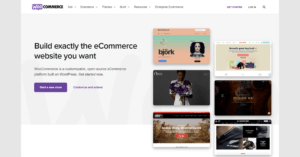
- WooCommerce is an open-source eCommerce solution available as a WordPress plugin.
- It is the world’s most popular eCommerce platform, with over 12% of all online stores using it.
- The plugin seamlessly integrates essential online store functionality into your WordPress site.
- WooCommerce offers a user-friendly setup process suitable for beginners and advanced users.
- Once installed and activated, you can manage your online store directly from the WordPress dashboard.
- The platform provides a comprehensive set of ecommerce features, including inventory management and payment processing.
- WooCommerce offers a vast library of extensions to enhance functionality, including tools for store management, shipping, and marketing.
Pros:
- WordPress theme compatibility: because it integrates with WordPress, it is compatible with WordPress’ extensive theme catalogue.
- Additional eCommerce functionality: Install WooCommerce extensions and WordPress plugins to add more eCommerce functionality and features to your online store.
- Huge online community: You’ll benefit from a large online community to help you solve any issues with your online store.
Cons:
- Multiple extensions are required: WooCommerce does not come with many features by default, so you will need to manually add them.
💡 Related guide: 27 Best & Highest-Paying AI Affiliate Programs
6. OpenCart.
Best Ecommerce Platform For International Selling.

OpenCart is a self-hosted open-source eCommerce software with a plethora of built-in tools. It has an easy-to-use dashboard with all the information you need to keep track of your store’s performance, such as total order volume and eCommerce sales analytics.
- OpenCart is a free and open source ecommerce platform that allows users to create and manage online stores.
- It is highly customizable and flexible with thousands of extensions and themes available.
- OpenCart supports multiple languages, currencies and stores.
- It is also scalable and suitable for large ecommerce businesses.
- OpenCart is an open-source self-hosted eCommerce software with built-in tools.
- The platform offers an intuitive dashboard that provides comprehensive information on store performance, including order volume and eCommerce sales analytics.
- OpenCart uses a module system for customization, which may not be as intuitive as drag-and-drop eCommerce website builders.
- However, the module system is simple enough for first-time users to easily create their online store.
- OpenCart provides a balance between functionality and ease of use for creating and managing an eCommerce website.
Features:
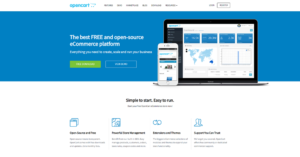
- OpenCart includes a default mobile-friendly theme, but compatible themes from third-party websites like Template Monster are also available.
- OpenCart stands out from other self-hosted solutions due to its built-in advanced features.
- The platform provides a multi-store admin feature, allowing users to manage multiple stores from a single interface.
- OpenCart supports unlimited products and offers product filtering and a marketing analytics tool without requiring additional extensions.
- Unlike other eCommerce solutions, OpenCart includes these advanced features as part of its core functionality.
- The multi-store feature enables admins to customize each store with different themes, localize settings, and set varying product prices.
- OpenCart incorporates a built-in affiliate system, allowing the setup of different rates for each affiliate partner.
- The platform supports 36 payment methods, including popular options like PayPal, bank transfers, and cheques.
Pros:
- Guest checkout: It enables site visitors to shop without creating an account.
- Advanced built-in features: because there are numerous integrated features, users do not need to add many extensions.
- Multi-lingual support: Support for multiple currencies and languages is ideal for reaching a global audience.
Cons:
- There is no drag-and-drop website builder: The only way to customize your store design is to use OpenCart’s module system.
- No built-in SEO features: You must use extensions to optimize your online store for search engines.
Pricing:
OpenCart has no monthly fees and the software is free to download; all you need to get started is web hosting and a domain name.
Users can also create a comprehensive online store by selecting from a variety of free and paid extensions available in the marketplace. Premium extensions cost $20.
💡 Related guide: Best AI Tools for Business
7. Square Online.
Best Ecommerce Platform For Local Businesses.
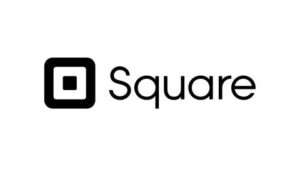
Square, the popular point-of-sale system, introduced “Square Online” as an ecommerce solution to assist retailers in moving their businesses online.
Square Online, formerly known as Weebly before being acquired by Square, provides excellent value for money as well as good design flexibility.
Weebly is still around, and it’s great for small businesses. Square Online, on the other hand, may be what you need if you run a larger ecommerce store.
It includes all of the necessary features, such as built-in marketing tools and a dashboard that displays all of the info you require at a glance.

- Square Online is an ecommerce platform owned by Square, a payment processor.
- The platform has been integrated with the website builder Weebly after Square’s acquisition.
- Accounts on Square or Weebly lead to the same interface, with different access rights based on the purchased plan.
- Square Online’s builder is user-friendly but offers fewer features, widgets, and customization options compared to other eCommerce platforms.
- The app marketplace of Square Online is not as extensive as WooCommerce or Shopify, but it does integrate with platforms like OpenTable, LinkTree, and GoDaddy.
- Square, being a payment processor, provides various payment options such as buy now, pay later, Apple Pay, Google Pay, and Cash App Pay.
- Square Online offers basic SEO features like 301 redirects, search engine visibility, and customizable meta titles and descriptions for products and pages.
It’s an excellent ecommerce platform on its own, but it also has excellent options for small businesses.
Two examples are curbside pickup and local delivery.
Features:

- It makes it simple to create a beautiful and professional website for your company. You can choose from a variety of templates and designs, or you may start from scratch and create something unique.
- SEO tools, social media integrations, and marketing campaigns can help you reach more customers and drive traffic to your website.
- Make a professional website that works well on all devices. You’ll be able to use custom fonts, colors, and layouts to make your site look exactly how you want it to.
- Website plans and transactions are priced competitively. There are no hidden costs or long-term contracts, so you can start and stop your service whenever you want.
- It’s a simple setup and a versatile option for small businesses looking to go online quickly and easily.
- You can directly sell from your Instagram feed and then scale up to a full-fledged ecommerce website when you’re willing.
- One more strongest trait is their secure online payments and the ability for customers to pay using Apple Pay and Google Pay.
- Store builder that is clean and simplistic.
- Advanced machine learning to detect and prevent payment fraud.
- Create a link, buy button, or QR code quickly to accept online payments.
- It is compatible with other ecommerce platforms such as WooCommerce, Ecwid, Wix, and others.
Square Online also has a few standalone features for small business websites:
- Retail tools for both online and in-person sales.
- Restaurant websites that accept online food orders.
- Square appointments allow for online bookings.
- The ability for nonprofit websites to accept donations.
Pros:
- It’s simple to get started and have a website up and running in no time.
- Square’s payment processing is dependable and always works.
- You can easily create a website and integrate eCommerce functionality.
- Square Online’s interface enables easy and quick creation and management of various popups.
- The platform offers the option to provide coupon codes to clients and restrict access to minors, without the need for additional plugins or code snippets.
- Square Online’s tools are particularly useful for brick-and-mortar stores aiming to streamline their online and offline operations.
- The platform simplifies the integration or replacement of outdated offline payment systems, thanks to its straightforward setup and diverse payment capture methods.
- Paid subscriptions for Square Online start at $35/month.
Cons:
- The store designs are less customizable than the other options on this list.
- It is difficult to edit templates without some coding knowledge.
Pricing:

Square Online offers a free plan with unlimited products, on-demand delivery, gift cards and coupons, SEO tools, an SSL certificate, Instagram integration, inventory sync with Square POS, and other features.
If you choose to upgrade to one of their paid plans, you will gain the following benefits:
- Professional ($12/month): Custom domain name (free for one year) and no Square branding.
- Performance ($26/month): Unused cart emails, on-site customer reviews, and discounted shipping labels are now available.
- Premium ($72/month): Super low transaction fees, the best shipping discounts, and a shipping rate calculator that works in real time.
All in all, if you’re a traditional retailer or local business looking to go online, Square Online is a great option.
Get Started With Square Online.
💡 Related guide: 7+ Best AI Photo Editing Software
8. SquareSpace.
Best Ecommerce Platform For Customized Templates & Themes.
Squarespace is a well-known ecommerce platform allowing you to create allows any kind of website you want, not just online stores.
In comparison to other website builders, the ecommerce platform has a high uptime reliability. That means you can be confident that your store will be available to your customers at all times.
Squarespace offers a free custom domain for a year, SSL for all of its plans, storage, hosting, and other features.
It’s simple to use and set up, with a drag-and-drop builder that allows you to create your website quickly.
Because Squarespace was not designed specifically for ecommerce, its marketing offerings are not as extensive as those of other ecommerce platforms such as Shopify and BigCommerce.
If you want to extend Squarespace’s capabilities, you can do so through their Extensions marketplace.
Features:

- Squarespace offers a comprehensive package for starting a store, providing various themes, customizable features, and more.
- It is particularly popular among artisans and creatives due to its emphasis on aesthetics.
- Squarespace’s template library is trendy and modern, allowing your store to have an impressive visual appearance.
- Although it may not have the largest integration library, Squarespace does have apps available to expand its functionality.
- You can connect your Squarespace website to third-party platforms such as Printful, Aftership, and FreshBooks for added capabilities.
- Squarespace supports the sale of diverse products, including memberships, video on demand, and physical products.
- When it comes to SEO, Squarespace allows customization of page URLs and meta descriptions and offers integration with Google Analytics.
- However, Squarespace’s SEO capabilities beyond these features are limited.
- Squarespace provides a directory of experts who specialize in areas such as SEO, branding, and paid ads, offering assistance if further optimization is needed for your site.
Pros:
- Page and website builder with many features.
- Design options are the best of any ecommerce website builder.
- Site features of high quality.
- Outstanding inventory system and analytical tools.
- Variable product types.
- Checkout forms that are unique to you.
- Purchase and print USPS shipping labels through the web or app.
- Email marketing software that is native to the platform.
Cons:
- A small app store offers fewer options than competing platforms.
- It takes some time to get used to navigating.
Pricing:
Squarespace offers four pricing plans: two for general websites and two for online stores specifically. Because we’re only interested in the latter, the choice is between the Basic Commerce plan and the Advanced Commerce plan.
- Basic Commerce: $26/month + 0% transaction fees
- Advanced Commerce: $40/month + 0% transaction fees
💡 Related guide: 13 Best Issue-Tracking Software
9. Ecwid.
Best Ecommerce Solution For Existing Websites.

Ecwid is a platform for creating and managing an online shop in the cloud. It allows you to sell your products and services across multiple channels, such as your website, social media, marketplaces, and in-person.
Ecwid is designed to be easy to use, fast to implement, and scalable to grow with your business.

If you have a functioning website and want to add a new store or shopping capabilities, this is the best option.
The platform is simple to use, which is a plus.
Furthermore, it is completely adaptable and allows users to sell on a variety of websites, including:
- Amazon
- eBay

- Adaptability allows reaching out to a large number of buyers worldwide on multiple platforms from a single dashboard.
- Getting started with Ecwid is effortless.
- Built-in integration with platforms like Joomla, Drupal, or WordPress Business makes starting with Ecwid even easier.
- Highly customizable storefront ensures maximum visibility for products across different devices.
- Prominently display brand elements such as logos, colors, and messages to attract the target audience.
- Create, manage, and track advertisements within Ecwid.
- Easy curation of Facebook and Google advertisements.
- Seamless integration with over 50 payment gateways, including First Data, PayPal, Square, Stripe, WePay, and more.
- In-built functionality with top POS systems simplifies the payment process.
Features:
- Sell anywhere: Ecwid lets you set up your online store once and sync it with various platforms, such as Facebook, Instagram, TikTok, Amazon, eBay, Google Shopping, and more. You can also integrate Ecwid with your existing website or create a new one with Ecwid’s site builder.
- Grow faster: It helps you attract and retain more customers with its marketing tools, such as automated Google and Facebook ads, TikTok, Pinterest and Snapchat pixel integrations, abandoned cart emails, discount coupons, gift cards, and SEO tools.
- Manage simply: It simplifies your ecommerce operations with its automation and integration features. You can connect to your customers’ preferred payment and shipping options, automate tax calculations and inventory tracking, customize your store design and notifications without coding, and manage your orders, products, promotions, and customers from your dashboard or mobile app.
- Integration with payment apps: Ecwid also offers a fully integrated payment method called Ecwid Pay that lets you accept cards, Google Pay, Apple Pay, and subscriptions.
- Live support: Ecwid provides expert support via chat, email, phone, or video call whenever you need it. You can also access Ecwid’s help center, community forum, blog, webinars, and tutorials for more guidance and tips.
Pros:
- Free plan: Ecwid offers a free plan that lets you sell up to 10 products online without any transaction fees. You can also upgrade to a paid plan anytime if you need more features or products.
- Easy setup: It is easy to set up and use. You can create your online store in minutes by following the step-by-step wizard. You can also embed Ecwid into your existing website with a few lines of code or use Ecwid’s site builder to create a new one.
- Multi-channel selling: It enables you to sell across multiple channels with ease. You can sync your inventory and orders across all platforms and manage them from one dashboard. You can also reach more customers by selling on social media and marketplaces.
- Scalable: Ecwid is scalable to grow with your business. You can add unlimited products and categories, sell in multiple currencies and languages, offer different shipping and payment methods, and customize your store design and functionality with apps and extensions.
Cons:
- Limited design options: Ecwid’s design options for your online store are limited. You can only select from a few themes and templates, or you can modify them with CSS. Without coding or the use of third-party apps, you cannot change the layout or structure of your store pages or add custom features.
- Limited SEO features: It only has a few SEO features for your online store. You are unable to change the URL structure or meta tags of your store pages, nor can you add rich snippets or schema markup. You cannot also create a blog or content pages in Ecwid without using third-party tools.
- Few integration options: It only provides a few integration options for your online store. Ecwid’s app market and API only allow you to connect to a few third-party apps and services. To integrate with other platforms or software, you may need to use Zapier or other tools.
Pricing:

Ecwid offers four pricing plans: Free, Venture ($15/month), Business ($35/month), and Unlimited ($99/month).
All plans include unlimited bandwidth, no transaction fees, live support, SSL security, mobile app, POS integration, Google Shopping ads integration, Facebook pixel integration.
💡 Related guide: 13 Best AI Tools for Students
10. Shift4Shop.
Feature Rich Ecommerce Platform.
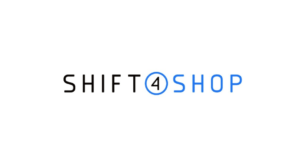
Shift4shop is a rapidly expanding ecommerce platform widely recognized for its strong SEO features, 50 free themes, and 100+ payment processors.
All plans include a domain name, no transaction fees, unlimited bandwidth, a Facebook store, an integrated blog, API access, and 24/7 technical support.

- Shift4Shop is a SaaS eCommerce solution with a user-friendly interface similar to the WordPress dashboard.
- Built-in website builder enables quick site design, making it suitable for users with limited technical knowledge.
- Features include SEO tools, abandoned cart recovery, and advanced product management.
- Standout feature is checkout customization, offering options for three-page or one-page checkout methods.
- Guest checkout option prevents cart abandonment, while customer accounts allow order tracking and automated recurring purchases.
- Supports digital downloads and event ticket sales, automatically sending encrypted download links to buyers via email.
Features:
- Free plan: Shift4Shop offers a free plan that lets you access all the features and tools of the platform without any transaction fees or limitations. You can sell unlimited products, use unlimited bandwidth and storage, access over 100 free themes, integrate with over 400 apps, and more. The only requirement is that you use Shift4’s payment processing service, which offers competitive rates and supports various payment methods.
- Website builder: The website builder lets you create a stunning and responsive website with its drag-and-drop website builder.
- Multi-channel selling: It enables you to sell across multiple channels with ease. You can sync your inventory and orders across platforms like Facebook, Instagram, Amazon, eBay, Google Shopping, and more.
- Marketing tools: It helps you attract and retain more customers with its marketing tools. You can create and manage email campaigns, social media posts, blogs, newsletters, coupons, gift cards, and more.
- Order management: It simplifies your order management with its automation and integration features. You can track and fulfill your orders from your dashboard or mobile app.
- Payment processing: It provides secure and seamless payment processing with its integrated solution from Shift4. You can accept credit cards, debit cards, digital wallets (e.g., Apple Pay, Google Pay), ACH payments, subscriptions, and more.
Pros:
- Integration: Shift4Shop can be easily integrated into existing systems and processes because it is fully hosted and maintained.
- Security: Secure and fully PCI compliant makes sure that your customers’ information is safe and not vulnerable to hackers.
- Feature-rich: Shift4Shop is one of the most feature-rich ecommerce platforms in the market. It offers everything you need to create and manage a successful online store, from website design and multi-channel selling to marketing and order management.
- Scalability: Shift4Shop is scalable to handle any level of traffic and sales. It uses a cloud-based infrastructure that ensures high performance, reliability, and security. You can also upgrade to a paid plan if you need more resources or support.
Cons:
- Payment processing requirement: Shift4Shop’s free plan requires that you use Shift4’s payment processing service, which may not suit everyone’s preferences or needs.
- Learning curve: It may have a steep learning curve for some users, especially those who are new to ecommerce or have limited technical skills. The platform has a lot of features and options that can be overwhelming or confusing at first.
- Customer support: The customer support may not be very responsive or helpful for some users. The platform offers live chat, phone, email, and ticket support, but some users have reported long wait times, unprofessional agents, or unresolved issues.
Pricing:
Their plans start at $19/month for a “Startup Store” and go up to $114.50/month for a “Pro Store“.
You can try them out for free for 15 days.
💡 Related guide: 13+ Best Online Course Platforms
11. Sellfy.
Best Ecommerce Platform For Digital Goods.
Sellfy is a simple but strong ecommerce platform that enables you to sell digital products, physical goods, and subscriptions all in one place.
Their software was initially designed to sell digital products (like eBooks, videos, music, and courses). Nonetheless, they provide a fully functional platform with all of the features required to sell physical products.
Sellfy is ideal for small businesses and bloggers who want to monetize their websites by selling digital products, subscriptions, or physical goods.
Features:
- Sellfy is an ecommerce platform for selling physical and digital goods.
- It allows online merchants to sell and deliver files directly from their websites.
- Sellfy supports embedding buy buttons and sharing product links on social media platforms like Facebook and YouTube.
- The platform offers automatic store translation for buttons and checkout pages based on visitors’ location and preferred language.
- Users can manually translate product categories, email templates, and other aspects of the store.
- It provides anti-fraud measures such as limited download attempts, unique download links, and PDF stamping for digital product security.
- The platform is PCI-ready, ensuring secure payment processing.
- Sellfy supports PayPal and Stripe as payment processing options, but no other payment gateways are available.
Pros:
- Simple and easy: Sellfy is simple and easy to use for both sellers and buyers. You can create your online store in minutes by following the step-by-step guide. You can also manage your products, orders, customers, and analytics from your dashboard or mobile app.
- Flexible and customizable: It is flexible and customizable to suit your needs and preferences. You can sell any type of product (digital, physical, print-on-demand, subscription) with any pricing model (one-time, recurring, pay-what-you-want). You can also customize your store design and functionality with your own branding, widgets, apps, and integrations.
- Affordable and transparent: It is affordable and transparent with its pricing plans. You can start with a free plan that lets you sell up to 5 products with no transaction fees. You can also upgrade to a paid plan that starts from $19 per month and offers more features and products. Sellfy does not charge any hidden fees or commissions on your sales.
Cons:
- Limited design options: Sellfy has limited design options for your online store. You can only choose from a few themes and templates or use CSS to modify them. You cannot change the layout or structure of your store pages or add custom features without coding or using third-party apps.
- Few integration options: It has very limited integration options for your online store. You can only connect to a few third-party apps and services via Sellfy’s app store or API. You may need to use Zapier or other tools to integrate with other platforms or software.
Pricing:

Sellfy provides one free version and three paid plans ranging from $29 to $159/mo.
The plans assist you in selling your products online.
You will not be charged any additional transaction fees. You also get email credits and priority customer support with the Business and Premium Plans.
This ecommerce platform provides a 14-day free trial and has no transaction fees.
🔥 Get Started with SELLFY for Just $19/mo + 30 days money back guarantee 🔥
💡 Related guide: Top 13 Best AI Recruiting Tool for future-proof hiring process
12. Volusion.
Best User-Friendly Ecommerce Platform.
Volusion has a simple and easy-to-use interface. Users can create their stores in minutes when combined with the drag-and-drop eCommerce website builder and free themes that cater to various niches and industries.
It is a solid all-around ecommerce platform with a lot of functionality and a new Content Builder that surpasses the ease of use of the Elementor WordPress plugin.

- Volusion is a hosted platform suitable for dropshipping companies.
- It offers dedicated dropshipping tools for configuring vendors and shipping costs.
- Abandoned cart reports and product ratings and reviews are available.
- The platform includes an advanced inventory tracker with low stock notifications.
- An analytics tool provides detailed reports for better business management and scaling.
- A mobile app allows running the eCommerce business on the go, with features like price updates, product photos, and inventory checks.
- Customer service is available 24/7 via live chat, email, and phone (excluding Personal plan users).
Features:
- Volusion is a cloud-based, hosted ecommerce solution that lets you build a fully functional online store from scratch.
- It has an easy to use website builder with features like in-page editing, drag and drop, site search, and more.
- Volusion offers a wide variety of free and premium themes that are responsive and customizable.
- Volusion has robust ecommerce features like inventory management, payment collection, unlimited product options, and more.
- It helps you reach more customers and grow your sales with built-in SEO management, newsletters, a CRM system, and more.
- Volusion integrates with dozens of apps and partners to add advanced functionality to your site.
- It also offers in-house marketing and web design services to help your business grow.
Pros:
- Volusion has a simple and intuitive interface that makes it easy to set up and manage your online store.
- It has a 99.9% uptime guarantee as it is hosted on Google Cloud Platform.
- Volusion does not charge any transaction fees on any of its plans.
- It has a comprehensive knowledge base and free 24/7 support to help you with any issues or questions.
Cons:
- Volusion’s plans have limited storage space and bandwidth, which may impact your site’s performance and scalability.
- It does not support digital products or dropshipping, which may limit your product options.
- It has fewer themes and apps than some of its competitors, which may affect your site design and functionality.
Pricing:

Volusion provides a 14-day free trial as well as four plans ranging from $35/month to $299/month based on the company’s annual Gross Merchandise Volume (GMV).
The Personal plan is the most affordable option for ecommerce stores with a GMV/year of up to $50,000. The Business plan, on the other hand, is appropriate for ecommerce stores with a $400,000 GMV per year.
Because it is aimed at ecommerce stores with a GMV of more than $500,000 per year, the most advanced plan on this ecommerce platform, Prime, comes with custom pricing upon request.
All Volusion plans include unlimited bandwidth, SEO features built in, social media integration, and free mobile-friendly themes.
If you want to give Volusion a try, you can begin with a 14-day free trial.
💡 Related guide: Best Credit Repair Software Options: Turbocharge your finances
13. Big Cartel.
Best Ecommerce Platform For Artists.
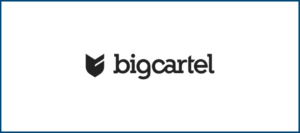
Big Cartel is an online store builder that allows you to add products and services, accept payments, and run promotions. It offers a free plan that gives you access to the tools you need to run an online store, as well as the ability to list up to five different products.
The platform is ideal for start-ups, particularly those with fewer than 500 products.

- Big Cartel is an online store builder for adding products, accepting payments, and running promotions.
- It offers a free plan with tools and allows listing up to five products.
- It is suitable for start-ups, especially those with fewer than 500 products.
- Big Cartel is user-friendly and ideal for artists looking to sell their work easily.
- It provides an all-in-one solution for creating, managing, and operating an online store.
- The platform has a simple design and is easy to use, making it accessible for those unfamiliar with e-commerce platforms.
Features:
- Big Cartel is a cloud-hosted ecommerce platform that was launched in 2005 and is designed for artists and creators looking for a place to sell their goods.
- It allows you to create and operate your online store from any device with internet access.
- Big Cartel offers a range of free and premium themes that are responsive and customizable, or you can create your own theme with its API.
- Big Cartel provides basic ecommerce features such as product display, inventory management, order fulfillment, shipment tracking, sales tax collection, and more.
- It helps you promote your store with built-in SEO tools, Google Analytics, discounts and promos, and social media integration.
Pros:
- Big Cartel has a free plan that lets you sell up to five products without any transaction fees.
- It has a simple and user-friendly interface that makes it easy to set up and manage your store.
- It gives you more control over your store than platforms like Etsy, as you can use your own domain name and branding.
- Big Cartel supports digital products and dropshipping through third-party apps.
Cons:
- Big Cartel has limited features and functionality compared to other ecommerce platforms like Shopify or WooCommerce.
- It does not have a built-in payment processor, so you need to use PayPal or Stripe to accept payments from customers.
- It has a low product limit of 500 on its highest plan, which may restrict your store growth and scalability.
- It has fewer themes and apps than its competitors, which may affect your store design and customization.
Pricing:
- Big Cartel offers four plans: Gold (free), Platinum ($9.99/month), Diamond ($19.99/month), and Titanium ($29.99/month).
- All plans include unlimited bandwidth, real-time stats, SSL security, custom domains, theme code editing, and more.
- Product images, inventory tracking, bulk editing, Google Analytics, discounts and promotions, shipment tracking, product option groups, sales tax autopilot, and other features are available in the higher plans.
- You can try Big Cartel for free for 14 days without a credit card on any of its paid plans.
💡 Related guide: Best AI Website Builder Options for creating professional websites quickly
Understanding SEO Features in Ecommerce Platforms

Search engine optimization (SEO) plays a vital role in driving organic traffic to your online store. When evaluating ecommerce platforms for their SEO capabilities, consider the following:
- Customizable URL Structures: Look for platforms that allow you to customize your URLs to include relevant keywords.
- Meta Tags and Descriptions: Ensure the platform enables you to optimize meta tags and descriptions for each product page.
- Mobile-Friendly Design: Choose a platform that offers responsive and mobile-friendly design templates, as Google prioritizes mobile-friendly websites in search rankings.
- Page Speed Optimization: Opt for an ecommerce platform that prioritizes page speed optimization, as faster-loading pages tend to rank higher in search results.
- XML Sitemap Generation: Check if the platform automatically generates XML sitemaps, which help search engines crawl and index your website effectively.
- Robots.txt Configuration: Ensure the platform allows you to customize the robots.txt file to control search engine crawling and indexing of your site.
- Canonical URLs: Look for platforms that support canonical URLs to prevent duplicate content issues and consolidate ranking signals.
- SEO-Friendly URLs: Choose a platform that automatically generates SEO-friendly URLs based on product titles or categories.
- Image Optimization: Check if the platform offers image optimization features, such as automatic compression and alt tag optimization, to enhance search engine visibility.
- Schema Markup: Consider platforms that support schema markup, which helps search engines understand the content and context of your products.
- Built-in Blogging: Integration of a blog within your ecommerce platform can help attract organic traffic through informative and keyword-rich content.
- Social Media Integration: Look for platforms that allow seamless integration with social media platforms, enabling you to share product pages and drive social signals.
You can improve your website’s visibility in search engine results and attract more organic traffic to your online store by choosing an ecommerce platform with strong SEO features.
Which ecommerce platforms offer built-in payment gateways?

One of the most important features of an ecommerce platform is the ability to accept online payments from your customers. You want a platform that offers built-in payment gateways that are secure, convenient, and compatible with different payment methods such as credit cards, debit cards, PayPal, Apple Pay, Google Pay, etc.
Some of the ecommerce platforms that offer built-in payment gateways are:
- Shopify: Shopify is one of the most popular and widely used ecommerce platforms in the world. It offers its own payment gateway called Shopify Payments which allows you to accept payments from over 100 countries and currencies without any additional fees or third-party accounts. Shopify Payments also integrates with other payment gateways such as Stripe, PayPal, Amazon Pay, etc.
- Wix: Wix is another popular ecommerce platform that offers its own payment gateway called Wix Payments which allows you to accept payments from over 40 countries and currencies without any additional fees or third-party accounts.
- Squarespace: Squarespace is a well-known ecommerce platform that offers its own payment gateway called Squarespace Commerce which allows you to accept payments from over 200 countries and currencies without any additional fees or third-party accounts.
Are there any transaction fees associated with using these ecommerce platforms?

One of the factors that can affect your profit margin as an online seller is the transaction fees charged by your ecommerce platform or payment gateway. These are usually a percentage of each sale that goes to the provider as a service fee.
Some of the ecommerce platforms that charge transaction fees are:
- Shopify: Shopify charges transaction fees ranging from 0.5% to 2% depending on your pricing plan and payment gateway. However, you can avoid these fees if you use Shopify Payments as your payment gateway.
- Wix: Wix charges transaction fees ranging from 0% to 2.9% depending on your pricing plan and payment gateway. However, you can avoid these fees if you upgrade to one of their Business or eCommerce plans which include Wix Payments as your payment gateway.
- Squarespace: Squarespace charges transaction fees ranging from 0% to 3% depending on your pricing plan and payment gateway. However, you can avoid these fees if you upgrade to one of their Commerce plans which include Squarespace Commerce as your payment gateway.
Can I integrate third-party applications and plugins with these platforms?

One of the features that can enhance your online store functionality and performance is the ability to integrate third-party applications and plugins with your ecommerce platform. These are software tools or services that can add new features or capabilities to your site such as analytics, marketing, social media, inventory management, shipping, taxes, etc.
Some of the ecommerce platforms that allow integration with third-party applications and plugins are:
- WooCommerce: WooCommerce is one of the most integrated ecommerce platforms in the world. It allows you to connect your site with over 50 thousand WordPress plugins and extensions that can add any feature or functionality you need. You can also integrate your site with hundreds of external applications such as Google Analytics, Mailchimp, Facebook, Shopify, etc.
- Shopify: Shopify is another highly integrated ecommerce platform in the market. It allows you to connect your site with over 6000+ apps and plugins that can add various features and functionalities to your site. You can also integrate your site with many external applications such as Google Analytics, Mailchimp, Facebook, Instagram, Etsy, eBay, etc.
Do these platforms offer SEO tools and features?
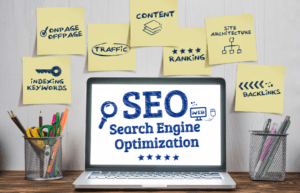
One of the features that can boost your online store visibility and traffic is the SEO tools and features offered by your ecommerce platform. These are the tools and features that can help you optimize your site for search engines such as Google, Bing, Yahoo, etc.
Some of the ecommerce platforms that offer SEO tools and features are:
- Shopify: Shopify offers basic SEO tools and features for your online store. It allows you to edit your site’s title, meta description, URLs, alt text, etc. It also generates a sitemap for your site and submits it to search engines automatically. It also integrates with Google Analytics and Google Search Console to help you track and analyze your site’s performance.
- Wix: Wix offers similar SEO tools and features as Shopify. It also allows you to edit your site’s title, meta description, URLs, alt text, etc. It also generates a sitemap for your site and submits it to search engines automatically. It also integrates with Google Analytics and Google Search Console to help you track and analyze your site’s performance.
- Squarespace: Squarespace offers more advanced SEO tools and features for your online store. It allows you to edit your site’s title, meta description, URLs, alt text, etc. It also generates a sitemap for your site and submits it to search engines automatically. It also integrates with Google Analytics and Google Search Console to help you track and analyze your site’s performance. Additionally, it offers more SEO options such as SSL certificates, AMP support, structured data markup, canonical tags, etc.
Are there any restrictions on international shipping or multiple currencies?
The ability to offer international shipping or multiple currencies to your customers is one of the features that can increase your online store’s reach and revenue.
Some of the ecommerce platforms that offer international shipping or multiple currencies are:
- Shopify: Shopify offers international shipping and multiple currencies options for your online store. It allows you to set up different shipping zones, rates, and methods for different countries or regions. It also allows you to display prices in different currencies and accept payments in over 100 currencies using Shopify Payments or other payment gateways.
- BigCommerce: BigCommerce offers similar international shipping and multiple currencies options as Shopify. It also allows you to set up different shipping zones, rates, and methods for different countries or regions. It also allows you to display prices in different currencies and accept payments in over 100 currencies using BigCommerce Payments or other payment gateways.
Selling Digital Products on Ecommerce Platforms

If you plan to sell digital products like e-books, software, or online courses, you must choose an ecommerce platform that supports digital product sales. When evaluating platforms, keep the following features in mind:
- File Management: Look for platforms that allow you to securely upload and manage digital files, ensuring they are protected from unauthorized access.
- Automatic Delivery: Choose a platform that offers automated delivery of digital products to customers upon purchase, either through email or secure download links.
- File Format Support: Check if the platform supports the file formats commonly used for your digital products, ensuring compatibility and a seamless customer experience.
- License Key Generation: For software or membership-based digital products, consider platforms that can generate and manage unique license keys for customer access.
- Content Protection: If your digital products require content protection, evaluate platforms that offer DRM (Digital Rights Management) capabilities to safeguard your intellectual property.
You can effectively sell and manage digital products by leveraging the right ecommerce platform, expanding your business offerings beyond physical goods.
Ecommerce Platforms for B2B Businesses

For B2B businesses, specific ecommerce platforms cater to their unique needs. When selecting an ecommerce platform for B2B, consider the following features:
- Customer Group Management: Look for platforms that allow you to segment customers into different groups or tiers, offering personalized pricing, discounts, or catalogs.
- Wholesale and Bulk Ordering: Choose platforms that support wholesale pricing and bulk ordering capabilities, catering to the needs of B2B customers.
- Customizable Pricing and Quoting: Some platforms offer the ability to create custom pricing agreements and quoting systems for individual B2B clients.
- Integration with ERP and CRM Systems: Evaluate platforms that seamlessly integrate with popular ERP (Enterprise Resource Planning) and CRM (Customer Relationship Management) systems to streamline operations and customer management.
- Order Approval Workflows: If your B2B business requires multi-level order approval processes, consider platforms that offer configurable workflows to facilitate the process.
- Punchout Integration: Some platforms support punchout integration, allowing B2B customers to access your ecommerce platform directly from their procurement system.
By choosing an ecommerce platform tailored for B2B businesses, you can enhance the buying experience for your corporate clients and streamline your B2B operations.
Payment Gateways Supported by Ecommerce Platforms

A crucial aspect of any ecommerce business is facilitating secure and convenient online transactions. Look for ecommerce platforms that support popular payment gateways, such as:
- PayPal: A widely recognized and trusted payment gateway that offers seamless transactions and buyer protection.
- Stripe: Known for its developer-friendly integration, Stripe supports a range of payment methods and provides robust security features.
- Authorize.Net: A popular choice for businesses in the United States, Authorize.Net offers secure payment processing and customizable checkout options.
- Square: Square provides an integrated ecosystem for in-person and online payments, making it suitable for businesses with both physical and online stores.
- Braintree: Owned by PayPal, Braintree offers global payment processing, fraud protection, and recurring billing options.
Verify that the ecommerce platform you choose supports the payment gateways that are relevant to your target audience and business needs, allowing for a smooth and secure checkout experience.
Ensuring Secure Transactions on Ecommerce Platforms

To protect customer data and build trust, ecommerce security is critical. When evaluating ecommerce platforms, keep the following security measures in mind:
- SSL/TLS Encryption: Look for platforms that provide SSL/TLS encryption to secure data transmission between customers’ browsers and your website.
- PCI Compliance: Ensure that the platform is Payment Card Industry Data Security Standard ( PCI DSS) compliant, meaning it adheres to the industry standards for securely processing and storing credit card information.
- Fraud Prevention: Evaluate platforms that offer robust fraud prevention tools and integrations with third-party fraud detection services to minimize the risk of fraudulent transactions.
- Secure Hosting: Choose a platform that provides secure hosting with regular security updates and monitoring to protect against vulnerabilities and unauthorized access.
- Data Backup and Recovery: Look for platforms that offer automatic data backup and recovery options, ensuring that your business and customer data are protected in case of system failures or data breaches.
- User Access Controls: Ensure that the platform offers user access controls and permission settings to limit access to sensitive information and functionalities based on roles and responsibilities.
- Secure Payment Gateways: Select platforms that integrate with reputable and secure payment gateways, offering additional layers of encryption and fraud protection during payment processing.
- Security Audits and Compliance: Consider platforms that undergo regular security audits and comply with industry regulations to ensure the highest level of security for your ecommerce store.
You can instill trust in your customers and protect their sensitive information by prioritizing security features and selecting a reliable and secure ecommerce platform.
Customer Support on Ecommerce Platforms

Access to dependable customer support is critical for smooth operations and the resolution of any issues that may arise. Consider the following aspects of customer support when evaluating ecommerce platforms:
- 24/7 Support Availability: Look for platforms that offer round-the-clock customer support, ensuring assistance is available whenever you need it.
- Multiple Support Channels: Evaluate platforms that provide various support channels such as live chat, email, phone, or support ticket systems, allowing you to choose the most convenient option.
- Knowledge Base and Documentation: Check if the platform offers a comprehensive knowledge base, tutorials, and documentation to assist with self-help and troubleshooting.
- Community Forums: Consider platforms that have active user communities or forums where you can interact with other merchants and gain insights or seek advice.
- Dedicated Account Manager: Some platforms offer dedicated account managers or consultants who can provide personalized guidance and support for your specific business needs.
- Response Time: Research the average response time for customer support inquiries and ensure it aligns with your expectations and requirements.
- Customer Reviews and Reputation: Read customer reviews and assess the platform’s reputation for customer support to gauge the quality and effectiveness of their services.
By choosing an ecommerce platform with reliable and responsive customer support, you can minimize downtime, address any technical issues promptly, and ensure a positive experience for both you and your customers.
Affordable Ecommerce Platforms
Unlock cost-effective ecommerce solutions for your business. Explore budget-friendly options to boost sales and expand your online presence. Learn more about affordable ecommerce platforms.
Consider the following ecommerce platforms if you’re starting on a tight budget or looking for low-cost options without sacrificing functionality:
- Shopify: Shopify offers a range of pricing plans to suit different budgets, starting from $29 per month. It provides a user-friendly interface, extensive app store, and reliable customer support options.
- WooCommerce: As a free plugin for WordPress, WooCommerce is a cost-effective solution that allows you to transform your WordPress website into a fully functional online store. It offers extensive customization options and exceptional SEO capabilities.
- Volusion: With plans starting at $29 per month, Volusion provides an all-in-one platform that is easy to navigate. It offers a user-friendly interface and various built-in features to support your business growth.
Hosted Ecommerce Platforms: Top Picks
Discover the best hosted ecommerce platforms for your company. With these recommended options, you can enjoy hassle-free setup and maintenance. Click here to learn more about the best hosted ecommerce platforms.
Consider the following top picks if you prefer a hosted ecommerce platform that handles all technical aspects for you:
- Shopify: Shopify is a leading hosted ecommerce platform that provides a complete solution for setting up and managing your online store. With its robust infrastructure, secure hosting, and reliable customer support, Shopify allows you to focus on growing your business while leaving the technicalities to the experts.
- BigCommerce: As a hosted platform, BigCommerce offers a seamless experience in terms of setup and maintenance. It provides enterprise-level features, scalability, and secure hosting, ensuring that your online store can handle high volumes of traffic and transactions.
- Wix: Wix’s hosted ecommerce platform combines simplicity and functionality. It takes care of hosting, security, and regular updates, allowing you to concentrate on building and marketing your online store. Wix also offers a range of built-in ecommerce features and integrates seamlessly with third-party apps.
Unleash Flexibility with Open-Source Ecommerce Solutions
Discover the potential of open-source ecommerce solutions. Investigate the advantages and select the best open-source platform for your company. Click here to learn how to use open-source ecommerce.
Open-source ecommerce solutions are an excellent choice for businesses seeking complete control and customization. The following are some notable open-source platforms:
- WooCommerce: Powered by WordPress, WooCommerce is a popular open-source ecommerce solution. It offers extensive customization options, a wide range of plugins, and a supportive community. With WooCommerce, you can tailor your online store to suit your unique business requirements.
- Magento: Magento is a robust open-source ecommerce platform known for its scalability and flexibility. It provides advanced customization capabilities, multi-store functionality, and a vast array of extensions and integrations. Magento is ideal for businesses with complex ecommerce needs.
- PrestaShop: It is a feature-rich open-source platform that offers a user-friendly interface and a range of customization options. It provides a comprehensive set of tools for managing products, orders, and customer relationships.
Wrap-up
Choosing the best ecommerce platform is crucial to your online business’s success.
You can make an informed decision that aligns with your business goals by researching the top ecommerce platforms for 2024, taking into account affordability, startup-friendliness, customization options, and CMS capabilities.
The future of ecommerce platforms is full of exciting possibilities. We’re talking about tying SEO tools, web hosting services, and even credit repair software together. However, it is about more than just technology; it is about creating online spaces that truly resonate with people.
Consider shopping experiences that offer both products and solutions tailored to specific needs. This combination is transforming ecommerce into a center of comfort, trust, and boundless innovation.
When it comes to selecting the best ecommerce platform for your online store, there is no one-size-fits-all solution.
The best approach is to examine each platform’s services and features carefully to ensure that it fits your budget, goals, and business requirements.
As a result, we have selected the five best ecommerce solutions based on various criteria:
- Nexcess: Best ecommerce platform overall.
- Shopify: Best ecommerce platform for small businesses. Offers beginner-friendly features and third-party integrations to make it simple to start an online store.
- WooCommerce: Most flexible. One of the most popular eCommerce solutions is this WordPress plugin. It’s highly customizable, simple to set up, and appropriate for any kind of online store.
- BigCommerce: Best ecommerce platform for large businesses. Allows you to sell across multiple channels, has a flexible enterprise plan, and facilitates headless commerce.
- Sellfy: Most effective ecommerce platform for selling digital goods. Endorses a variety of products, ranging from digital to print-on-demand.
To ensure a seamless and successful online shopping experience for your customers, prioritize essential features such as SEO capabilities, mobile friendliness, inventory management, and transaction security.
Choose the ecommerce platform that best meets your company’s needs, and prepare to unleash the full potential of ecommerce in 2024.
FAQ’s
Q. What are the top ecommerce platforms for small businesses in 2024?
the top 5 ecommerce platforms for small businesses are:
- Shopify: Best ecommerce platform for small businesses overall, with built-in SEO features and intuitive interface.
- Hostinger: Best ecommerce platform for beginners to small businesses.
- Squarespace: Best ecommerce platform for mobile, with award-winning templates and no transaction fees.
- Magento: Best ecommerce platform for retailers, with flexible and scalable features and a large community of developers.
- WooCommerce: Best ecommerce platform for software integration, with a plugin that works with WordPress and allows customization and extensibility.
Q. Which ecommerce platform offers the best SEO capabilities?
the best ecommerce platform for SEO is Shopify, which offers optimization tools for almost all the ranking factors, such as:
- Site speed and performance
- Mobile-friendliness
- SSL certificate
- Sitemap and robots.txt files
- Meta tags and headings
- URL structure and redirects
- Breadcrumbs and navigation links
- Product reviews and ratings
- Schema markup and rich snippets
- Blogging and content marketing
- Social media integration
- Analytics and reporting
Q. What are the most affordable ecommerce platforms for startups?
Some of the most affordable ecommerce platforms for startups are:
- Square Online: Best for omnichannel selling, with a free plan that allows selling online, in-store, and on social media, as well as multiple delivery options.
- Ecwid by Lightspeed: Best for existing sites, with a free plan that allows adding an online store to any website or platform, such as WordPress, Facebook, or Instagram.
- Shift4Shop: Best free ecommerce platform, with a plan that offers unlimited products, bandwidth, and storage, as well as no transaction fees, if using Shift4 Payments as the payment processor.
Q. Which ecommerce platform has the best mobile-friendly templates?
Some of the ecommerce platforms that have the best mobile-friendly templates are:
- Squarespace: Best for stunning template designs, with responsive themes that adapt to any device and screen size, as well as a mobile app that allows editing and managing the site on the go.
- Wix: Best for drag-and-drop design, with a mobile editor that allows customizing the site’s appearance and functionality on mobile devices, as well as a mobile app that allows creating and managing the site from anywhere.
- Shopify: Best for fast-loading and easy-to-use templates, with themes that are optimized for speed and performance on mobile devices, as well as a mobile app that allows managing orders, inventory, customers, and marketing from anywhere.
Q. What are the recommended ecommerce platforms for dropshipping?
Some of the recommended ecommerce platforms for dropshipping are:
- Shopify: Best for dropshipping overall, with a large network of dropshipping apps and suppliers, such as Oberlo, Spocket, AliExpress, Modalyst, etc., as well as features that make it easy to import products, sync inventory, automate orders, track shipments, etc.
- BigCommerce: Best for boosting sales, with features that help increase conversions and revenue, such as abandoned cart recovery, coupons and discounts, product reviews and ratings, cross-selling and upselling, etc., as well as integrations with dropshipping apps and suppliers, such as Modalyst, Inventory Source, AliExpress Dropshipping App by Webkul Software Pvt Ltd., etc.
- WooCommerce: Best for versatility, with a plugin that works with WordPress and allows creating any type of online store with dropshipping functionality, using extensions such as WooCommerce Dropshipping by OPMC Australia Pty Ltd., AliDropship by Yaroslav Nevsky et al., DropshipMe by Yaroslav Nevsky et al., etc.
Q. Which ecommerce platform integrates well with social media?
Some of the ecommerce platforms that integrate well with social media are:
- Shopify: Shopify allows users to integrate their online store with various social media platforms, such as Facebook, Instagram, TikTok, Pinterest, etc. Users can also sell products directly on these platforms using Shopify’s native solutions or integrations.
- Wix: Wix enables users to integrate their online store with various social media platforms, such as Facebook, Instagram, TikTok, etc. Users can also sell products directly on these platforms using Wix’s native solutions or integrations.
- BigCommerce: BigCommerce allows users to integrate their online store with various social media platforms, such as Facebook, Instagram, Pinterest, etc. Users can also sell products directly on these platforms using BigCommerce’s native solutions or integratons
- Ecwid: Ecwid enables users to integrate their online store with various social media platforms, such as Facebook, Instagram, TikTok, etc. Users can also sell products directly on these platforms using Ecwid’s native solutions or integrations.
Q. What are the best ecommerce platforms for scaling a growing business?
Some of the best ecommerce platforms for scaling a growing business are:
- Shopify: Best for selling on multiple channels, with features that allow syncing products and inventory across Facebook Shops, Instagram Shopping, Pinterest Buyable Pins, Amazon, eBay, and more, as well as integrations with various apps and services for marketing, analytics, customer service, etc.
- BigCommerce: Best for boosting sales, with features that help increase conversions and revenue, such as abandoned cart recovery, coupons and discounts, product reviews and ratings, cross-selling and upselling, etc., as well as integrations with various apps and services for marketing, analytics, customer service, etc.
- Magento: Best for flexibility and scalability, with features that allow creating customized and complex online stores with multiple languages, currencies, tax rates, etc., as well as integrations with various apps and services for marketing, analytics, customer service, etc.
Looking for more help with your creative projects? Check out these additional useful articles:
- Top 13 BEST AI Recruiting Tools for Future-proof Hiring Process (2023)!
- 11 BEST AI Marketing Tools to Automate Your Business (2023)!
- 7+ BEST Credit Repair Software Options: Turbocharge Your Finances in 2023!
- 13+ BEST Transcription Software & Service to Convert Audio/Video to Text (2023)
- 7+ BEST Text-to-Speech Apps for Android in 2023: Even Siri Would Envy!
- Hyperlocal Social Media Marketing; The Secret Sauce To Crushing Your Competitors!
- 13 BEST YouTube Video Downloader Online in 2023 (Free & Paid Options).
- 13 Best YouTube To MP3 Converters of 2023: The Ultimate Soundtrack Snatchers!
- Best Online Courses Platforms: Create & Sell Courses Easily (2023).
- Best AI Photo Editing Software: Transform Your Images With Ease (2023).
- Best AI Image Generators: Unleash Your Inner Picasso With These Mind-blowing Tools.
- Best AI Website Builders For Creating Professional Websites Quickly In 2023.
- Best Web Hosting Services of 2023.
- Best Landing Page Builders for 2023.
- Best SEO Tools to Rank Your Website in 2023.
- 9+ Best AI Video Editing Software Of 2023 (Ranked & Reviewed)
- 7+ Best Video Editing Software for 2023 (Windows & Mac).
- 7+ Best AI Copywriting Tools for Beginners in 2023 (Ranked & Reviewed).















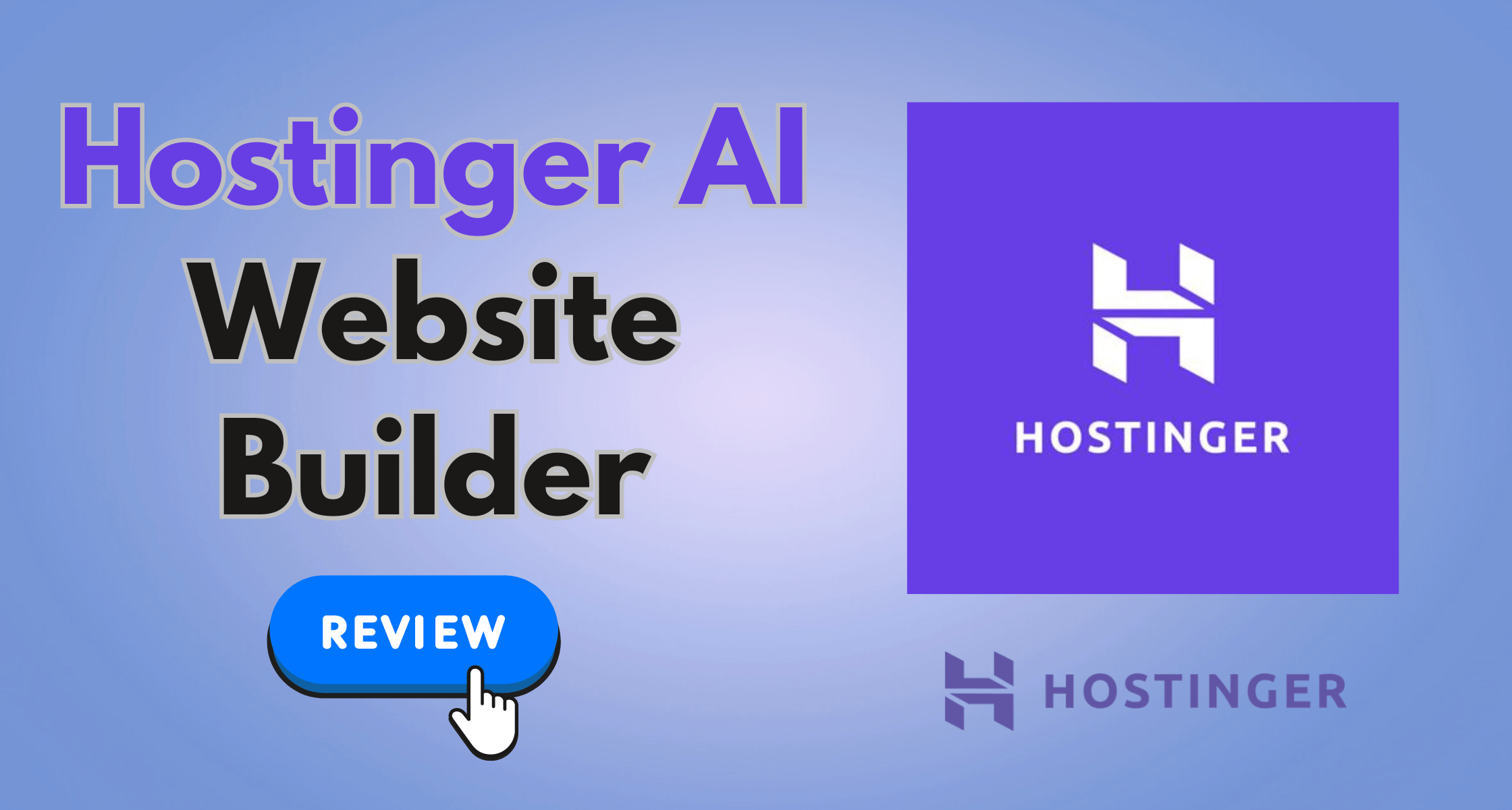
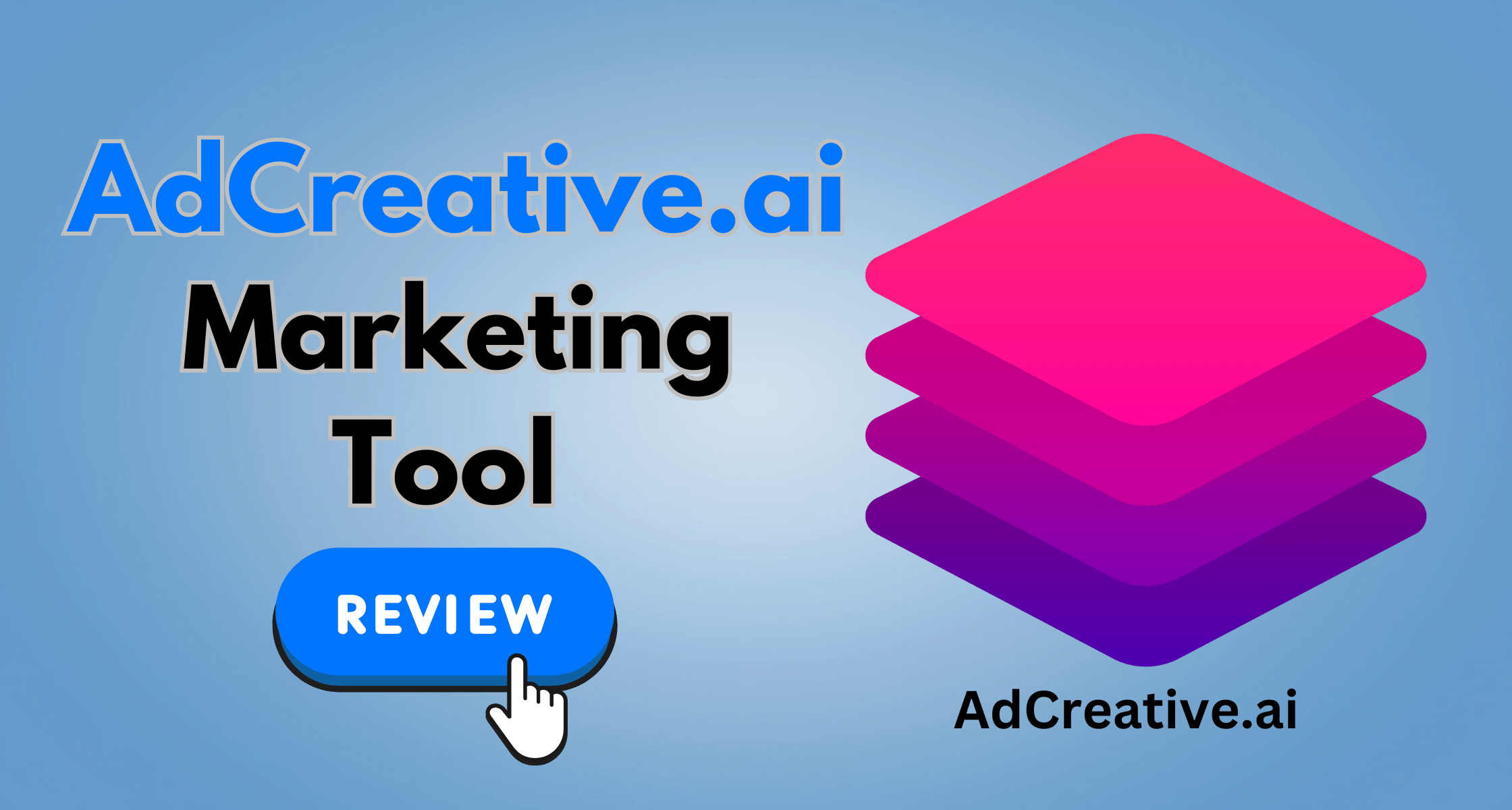
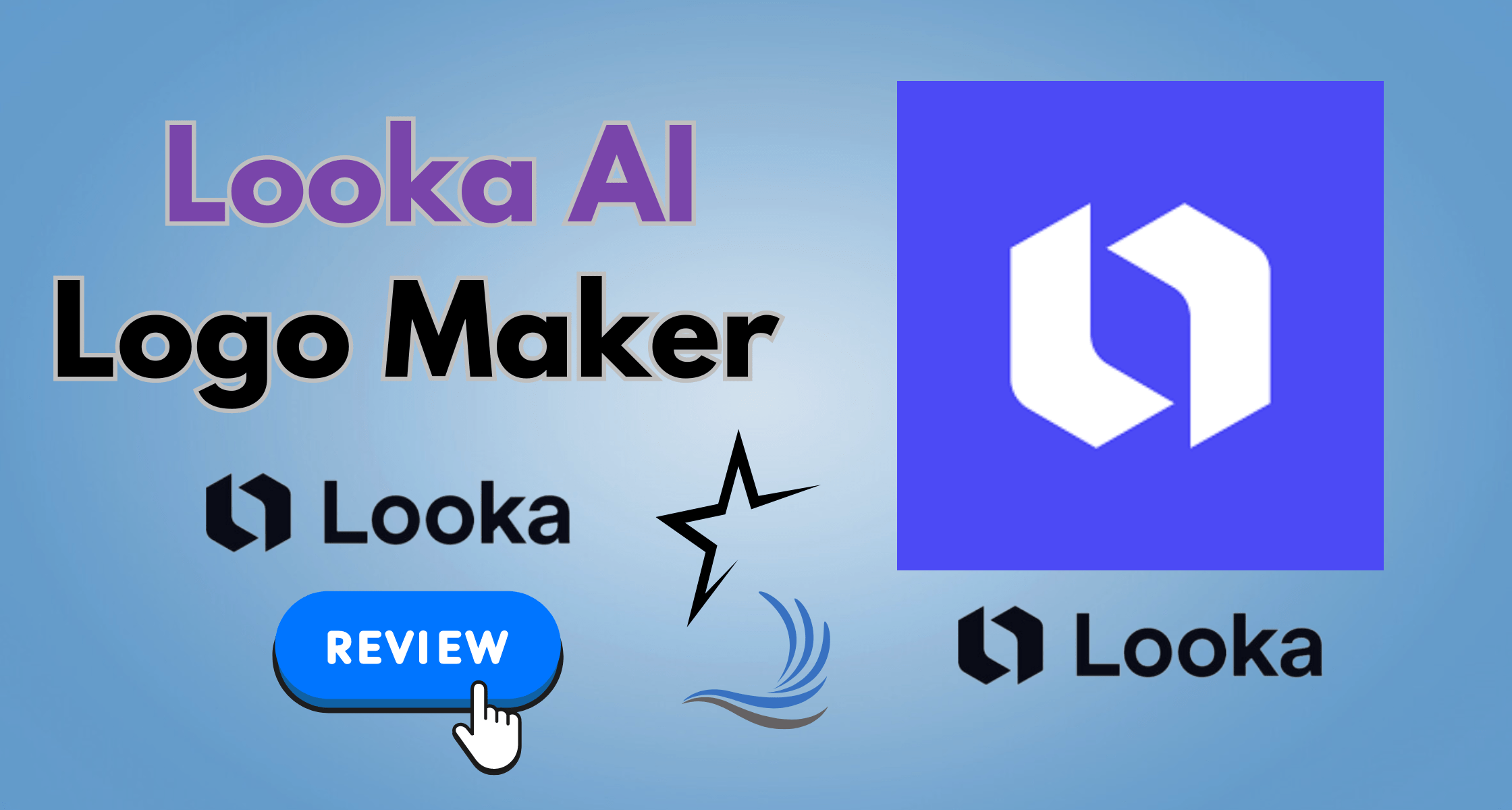



Статья заставила задуматься о возможности использования досок объявлений для поиска соседей по хобби или интересам.
I抳e read some just right stuff here. Definitely value bookmarking for revisiting. I surprise how so much attempt you place to create this kind of wonderful informative site.
Ограничение на время жизни сообщения: Сообщения автоматически удаляются через 24 часа после отправки, что может быть недостаточно для пользователей, которым нужно дольше сохранять свою переписку.
[…] Ecommerce Platforms […]
[…] Ecommerce Platforms […]
This article is a comprehensive guide that covers all the essential aspects of the topic. The author’s ability to explain complex ideas in a simple and accessible manner is commendable. It’s a valuable resource for anyone seeking a thorough understanding of this subject.
Эта статья оказалась исключительно информативной и понятной. Автор представил сложные концепции и теории в простой и доступной форме. Я нашел ее очень полезной и вдохновляющей!
Great write-up, I抦 normal visitor of one抯 website, maintain up the excellent operate, and It’s going to be a regular visitor for a lengthy time.
Have you ever thought about publishing an e-book or guest authoring on other websites? I have a blog centered on the same subjects you discuss and would love to have you share some stories/information. I know my subscribers would value your work. If you are even remotely interested, feel free to shoot me an email.
I feel that is one of the most important info for me. And i am happy studying your article. But want to remark on some normal things, The web site style is perfect, the articles is truly great : D. Just right task, cheers
Спасибо за эту статью! Она превзошла мои ожидания. Информация была представлена кратко и ясно, и я оставил эту статью с более глубоким пониманием темы. Отличная работа!
Я оцениваю тщательность и точность исследования, представленного в этой статье. Автор провел глубокий анализ и представил аргументированные выводы. Очень важная и полезная работа!
Эта статья действительно отличная! Она предоставляет обширную информацию и очень хорошо структурирована. Я узнал много нового и интересного. Спасибо автору за такую информативную работу!
Hmm it appears like your website ate my first comment (it was super long) so I guess I’ll just sum it up what I wrote and say, I’m thoroughly enjoying your blog. I as well am an aspiring blog blogger but I’m still new to the whole thing. Do you have any helpful hints for newbie blog writers? I’d really appreciate it.
Я чувствую, что эта статья является настоящим источником вдохновения. Она предлагает новые идеи и вызывает желание узнать больше. Большое спасибо автору за его творческий и информативный подход!
You made some decent points there. I looked on the internet for the topic and found most people will consent with your website.
Я впечатлен этой статьей! Она не только информативна, но и вдохновляющая. Мне понравился подход автора к обсуждению темы, и я узнал много нового. Огромное спасибо за такую интересную и полезную статью!
Я нашел эту статью чрезвычайно познавательной и вдохновляющей. Автор обладает уникальной способностью объединять различные идеи и концепции, что делает его работу по-настоящему ценной и полезной.
I have to voice my passion for your kindness giving support to those people that should have guidance on this important matter.
This is very interesting, You are a very skilled blogger. I have joined your feed and look forward to seeking more of your great post. Also, I have shared your website in my social networks!
[…] Ecommerce Platforms […]
Hmm, it seems like your site ate my first comment (it was extremely long) so I guess I’ll just sum it up what I had written and say, I’m thoroughly enjoying your blog. I as well am an aspiring blog writer, but I’m still new to the whole thing. Do you have any recommendations for newbie blog writers? I’d appreciate it.
The article offers a variety of perspectives on the issue.
[…] Ecommerce Platforms […]
[…] Ecommerce Platforms […]
[…] Ecommerce Platforms […]
With almost everything which appears to be building inside this specific subject matter, all your opinions are quite radical. Nevertheless, I appologize, because I can not give credence to your whole idea, all be it exciting none the less. It looks to us that your comments are generally not completely validated and in reality you are generally yourself not even completely convinced of the assertion. In any case I did enjoy looking at it.
I’m usually to running a blog and i really appreciate your content. The article has actually peaks my interest. I’m going to bookmark your web site and keep checking for new information.
My brother recommended I would possibly like this blog. He used to be totally right. This publish truly made my day. You cann’t consider simply how a lot time I had spent for this information! Thanks!
[…] Ecommerce Platforms […]
Simply desire to say your article is as astounding. The clearness in your post is simply great and i could assume you’re an expert on this subject. Well with your permission let me to grab your feed to keep up to date with forthcoming post. Thanks a million and please keep up the rewarding work.
Please can I link this writing? It’s valuable advice worth passing on! My followers will want to read this too.
I’m glad you find it helpful. If you want to link it forward, you’re more than welcome.
13 Best Ecommerce Platforms of 2023: Dominate the Online Market like a Pro! – Shakir Naseem
[url=http://www.gpvh59s4i91xxb29ofk72ptn2571w848s.org/]umpgtrxqbql[/url]
ampgtrxqbql
mpgtrxqbql http://www.gpvh59s4i91xxb29ofk72ptn2571w848s.org/
[…] Ecommerce Platforms […]
[…] Ecommerce Platforms […]
[…] Ecommerce Platforms […]
[…] Ecommerce Platforms […]
Hello! Someone in my Facebook group shared this website with us, so I came to give it a look. I’m enjoying the information. I’m bookmarking and will be tweeting this to my followers! Wonderful blog and amazing design and style.
[…] Ecommerce Platforms […]
As a Newbie, I am always searching online for articles that can help me. Thank you
[…] Ecommerce Platforms […]
Hey, would you mind if I share your blog with my twitter group? There’s a lot of folks that I think would enjoy your content. Please let me know. Thank you.
Of course you can share if someone find value through my blogs.
[…] Ecommerce Platforms […]
[…] Ecommerce Platforms […]
[…] Ecommerce Platforms […]
[…] Ecommerce Platforms […]
[…] Ecommerce Platforms […]
[…] Ecommerce Platforms […]
[…] Ecommerce Platforms […]